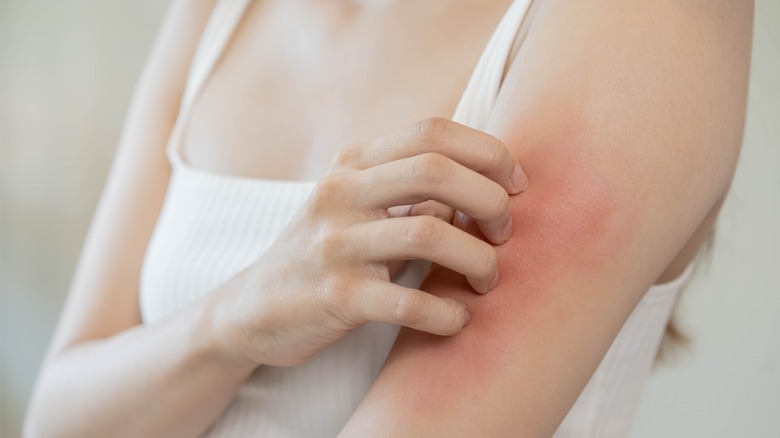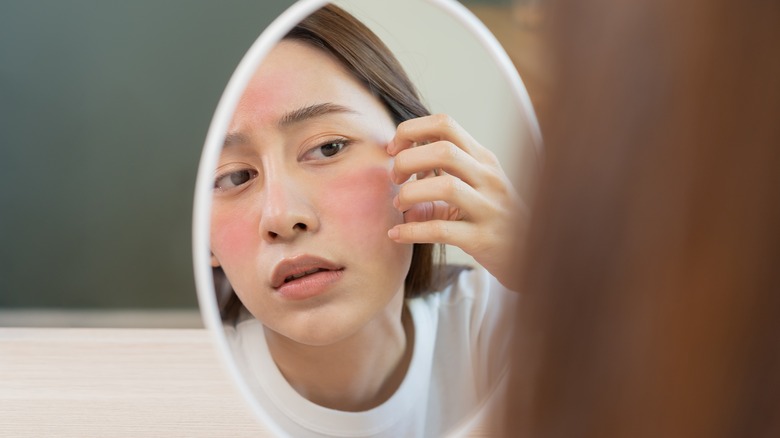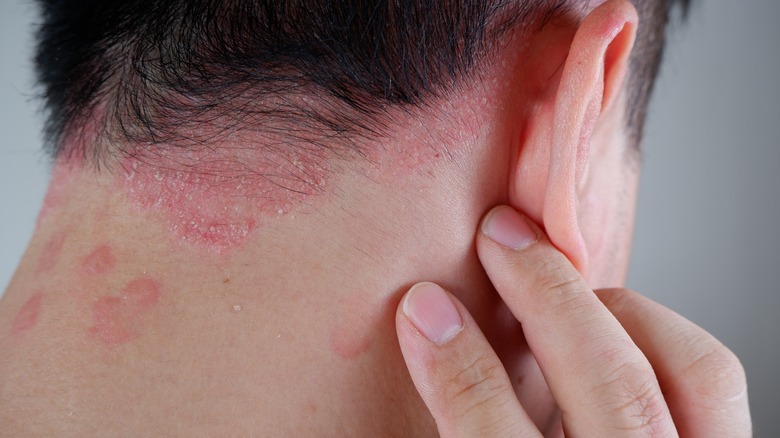Is It Possible To Have Eczema And Psoriasis At The Same Time?
Having itchy skin can be a nuisance or may really disrupt your daily life, depending on the severity of the underlying condition. From flaky, dry skin to visible red patches, itchy skin can be accompanied by a number of other symptoms. Finding the correct treatment often depends on knowing the root cause of why skin is inflamed.
According to Mayo Clinic, skin that is dry, itchy, red, or presenting with other symptoms is frequently caused by changes in weather, particularly drops in temperature and exposure to colder air. It's sometimes triggered by the use of scented or perfumed body washes, lotions, laundry detergent, or other products, and heat from excessively long or hot showers and artificial heat produced by fireplaces, stoves, and space heaters. Itchy, red skin can also be caused by medical conditions like eczema and psoriasis, both of which share similar symptoms. The question is, can skin be afflicted by more than one of these conditions at the same time?
A 2021 study published in Skin Health and Disease found that it is in fact possible for both eczema and psoriasis to exist simultaneously, making them potentially comorbid conditions. Researchers urge clinicians and healthcare professionals to be mindful of the coexistence of the two skin conditions so that patients can be assessed for the possible presence of both conditions. To determine if someone has eczema, psoriasis, or both, it's key to know the symptoms and side effects for each of the respective conditions.
Eczema's appearance varies
Eczema is an umbrella term used to describe several conditions that cause dry, itchy, and inflamed skin, per WebMD. Types of eczema include seborrheic dermatitis, neurodermatitis, stasis dermatitis, nummular eczema, dyshidrotic eczema, contact dermatitis, and atopic dermatitis. The latter form of eczema, called either atopic dermatitis or atopic eczema, is the most common type and is linked to allergies such as hay fever and asthma. Approximately 7% of adults have symptoms of atopic dermatitis, which usually begin in adulthood. For all types of eczema combined, only a small percentage of adults experience symptoms, while up to 20% of infants have some form of the condition.
Symptoms of eczema are hallmarked by a rash, though the appearance of eczema varies from person to person, reports Cleveland Clinic. Eczema can appear on any body part, but is often found on the skin of the neck, backs of the knees, ankles, feet, elbows, arms, hands, around ears, and on the face (with an emphasis of appearance on cheeks). The color of the rash caused by eczema is varied, with possible hues of red, pink, blush, gray, brown, and even purple.
There isn't a cure for eczema, but there are treatments and ways to manage flare-ups when they occur. When in doubt, it's best to avoid known triggers that inflame existing eczema. Otherwise, it's recommended that people who experience any form of eczema utilize unscented moisturizer following bathing, and seek prescription creams and medications if needed.
Psoriasis is an autoimmune disorder
The Centers for Disease Control and Prevention (CDC) define psoriasis as a form of chronic autoimmune disease afflicting the skin. When someone has psoriasis, their immune system expedites the cyclical growth of skin cells, resulting in painful side effects. This often includes the growth of thick patches of scaly skin and the potential development of internal symptoms, like psoriatic arthritis. The seven types of psoriasis most commonly diagnosed are inverse psoriasis, plaque psoriasis, pustular psoriasis, nail psoriasis, erythrodermic psoriasis, psoriatic psoriasis, and guttate psoriasis, per WebMD.
In the majority of cases, symptoms of psoriasis are flared by stimuli such as stress, diet, temperature and weather conditions, injury to the skin, and allergies. There are also several medications that can provoke psoriasis flare-ups, like beta blockers, blood pressure medications, nonsteroidal anti-inflammatory drugs (NSAIDS) like ibuprofen and naproxen, antimalarial medications, and prescriptions used to treat anxiety, depression, and heart conditions (via WebMD).
Treatment for psoriasis comes in three categories, comprising topical ointments, ultraviolet light phototherapy, and medications taken orally or by injection, according to the National Health Service (NHS). The specific type of treatment method used to treat psoriasis depends on the individual patient, but it's common for more than one form of treatment to be used simultaneously. Many of the topical creams used to treat psoriasis can also treat eczema, like corticosteroid ointments used to decrease inflammation on the skin.
Coexistence of eczema and psoriasis
Since eczema and psoriasis share similar symptoms, being able to identify the respective condition can help you and your doctor discern if you have one condition or both. The National Psoriasis Foundation states that commonly shared symptoms between eczema and psoriasis are skin rashes, changes in skin color, and itching. Usually, the unique symptoms of each condition are distinct enough that confusion is unlikely for a trained professional to decipher. However, there are parts of the body where it's trickier to determine if the skin rash is due to eczema or psoriasis. These include areas around the groin, soles of feet, and palms.
Penn Medicine warns that another shared aspect is the possibility of infection, especially when afflicted skin is scratched or dry skin leads to cracking. Regardless of one or both conditions being diagnosed, it's paramount to be conscious of the integrity of symptomatic skin so that bacteria doesn't enter and cause infection.
Besides the 2021 study defining existing comorbidity rates of psoriasis and eczema — specifically atopic dermatitis — previous studies have advocated for patient-centered treatment approaches for the conditions, both separately and together. A 2017 study published in Dermatology and Therapy concluded that educating patients about their skin condition can impact their quality of life, with more education resulting in better outcomes. The more someone knows about eczema, psoriasis, and their comorbidities, the greater likelihood of better management and quality of life.




